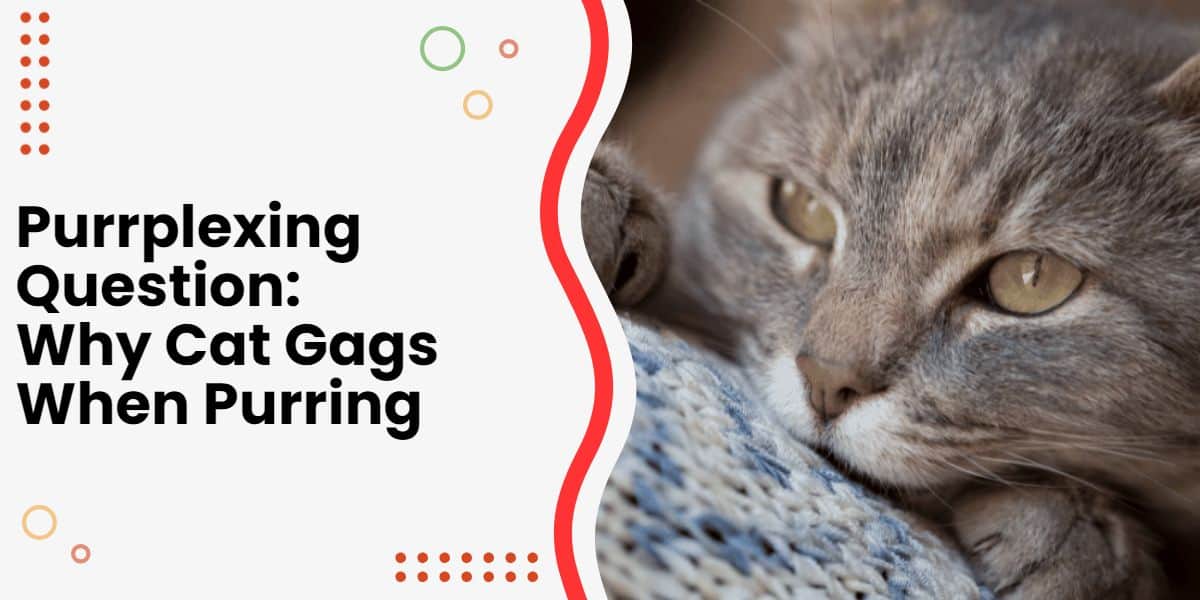Curled up on your lap, your purring feline friend brings a sense of comfort like no other. But have you ever noticed those occasional tiny gags amidst the soothing symphony of purrs?
Now, this behavior can seem puzzling for newbie owners. But fear not—you’re not alone in this case, and many other cat owners ask similar questions.
In this post, we’ll explore the ins and outs of this intriguing behavior, from the mechanics of purring to the potential reasons why your cat gags when purring.
Should you be worried about your cat? Let’s find out below!
Table of Contents
Cat Behaviors 101: Purrs and Gags
Before we head to why your cat appears to puke when purring, let’s first talk about why a cat purrs or gags in the first place.
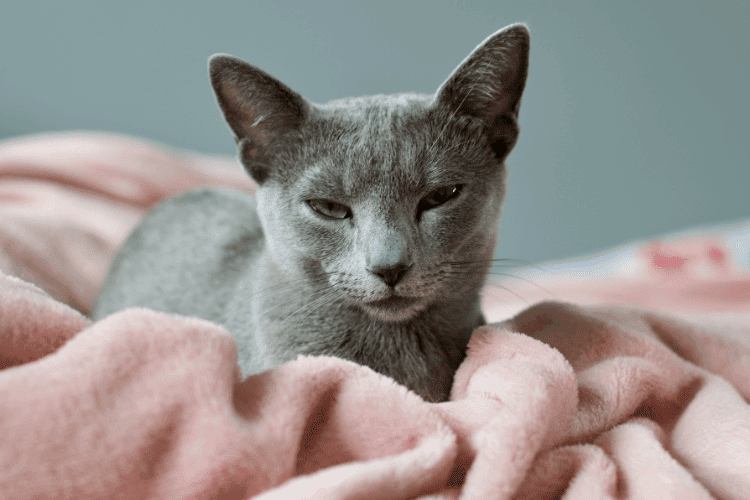
Why do Cats Purr?
Cat purring, often a heartwarming sign of contentment, carries multiple meanings.
When your feline friend nestles into your lap and starts their soothing serenade, it’s their way of saying, “I’m happy here,” as vet expert Megan Conrad pointed out.
Interestingly, this universal feline language doesn’t just end at happiness; it extends to stress relief, healing, and even messages to their human caregivers.
Why do Cats gag?
Gagging, on the other hand, is a totally different cat behavior.
Picture this: Your cat, the epitome of elegance, suddenly assumes a peculiar stance on your freshly acquired rug. Hunched over, emitting strange noises—yes, your cat is gagging.
Like us, our feline friends possess a formidable gag reflex, an innate mechanism that kicks into action when something irritates their throat.
You can say that gagging in cats is as natural as their endless curiosity, a bodily function designed to expel unwelcome intruders. So why does your cat gag when purring?
Possible Causes Why a Cat Gags When Purring
Cats gag for a wide variety of reasons. But the causes behind why they retch and purr simultaneously can range from harmless to life-threatening scenarios.
Here are some of the reasons your cat does it:
1. Expelling Stomach Hairballs
One common cause of your cat’s gagging is hairballs. When your cat grooms their velvety fur, tiny hair strands inevitably find their way down the throat and into the stomach.
But here’s the thing: hairballs aren’t supposed to be in the tummy. Ingesting hair leads to coughs and gagging as the cat’s body tries to get rid of it.
Some cats spit these hairballs out in vomit. And if your cat has too many hairballs in there, it might mean they’re allergic to food, have stomach issues, or are grooming too much.
Worst case, hairballs can result in intestinal blockage, which needs immediate veterinary attention. Some signs to watch out for are abdomen pains, frequent vomiting, and lack of bowel movements.
Here are some of the highest-quality cordless vacuums on the market.
2. Getting an Object Out
Occasionally, our feline friends may encounter a peculiar and potentially hazardous situation – a foreign body getting lodged in their throat.
Cats, with their curious nature, might swallow things they shouldn’t. It could include strings, bits of string-like material, or even items they’ve chewed on.
When these foreign objects break down into smaller pieces through chewing, they can trigger a gag reflex. This case isn’t just about the typical gagging you might associate with hairballs; it’s about an unexpected hitch in their system.
If you ever suspect that your cat has swallowed something it shouldn’t, refrain from attempting to extract it yourself. Such efforts can potentially harm their intestines.
Instead, seek prompt medical attention.
Related: What should I do if my cat’s purr sounds gurgly?
3. Eating Too Quickly
Did you notice your cat gulping down its food and suddenly making odd gagging sounds? Well, sometimes our furry pals can’t wait to finish their meals.
You see, some cats get a little too worked up when it’s mealtime. They get so eager they swallow their food hastily, leading to this perplexing problem.
What happens is that their bodies struggle to handle the fast intake, making them gag as their stomach tries to settle everything down.
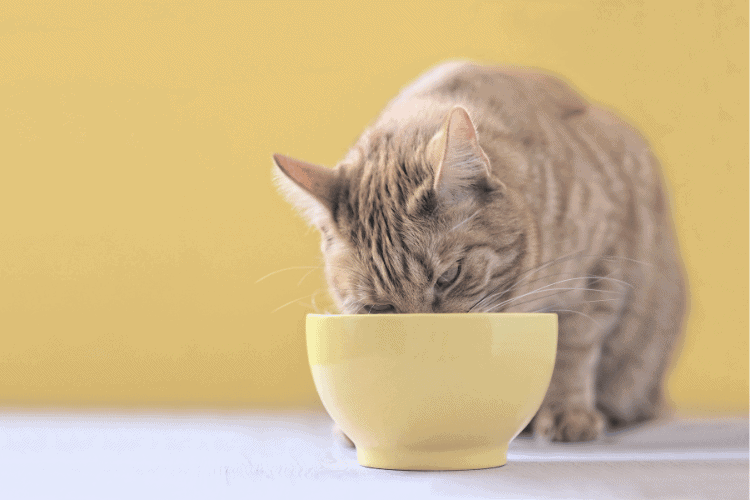
We know it’s cute to see your cat so excited about food, but making sure they eat at a more relaxed pace can keep them comfortable and healthy.
4. Experiencing Acid Reflux
Another possible reason for your cat gagging while purring is acid reflux, a discomforting condition some cats experience.
The issue happens when stomach fluids, laden with acids and other digestive liquids, make an unwelcome return to the esophagus, leading to inflammation and irritation.
Look out for signs of distress, like howling or excessive meowing. Weight loss and poor appetite can follow, as the pain might deter them from eating.
Occasionally, vomiting or regurgitation might also occur.
When it comes to prevention, consider your cat’s diet. Eating fatty foods can worsen acid reflux, so choose a diet with less fat to help your cat feel better.
5. Emerging Allergy Symptom
One reason for your cat gagging could be allergies—something not always easy to spot.
For cats, anything from dust to pollen or mold can trigger allergies. These things can make their throat swell up, leading to gagging even if nothing is coming out.
But it’s not just about the discomfort—allergies can become more severe by restricting their airways. And it often brings other troubles like vomiting, sneezing, coughing, and itchiness.
As an important note: if your cat is usually okay but suddenly starts gagging, breathing with an open mouth, or if their gum color changes, it’s time to head to the vet.
6. Feeling Nauseated
Though uncommon, nausea can still be a culprit. If your cat is occasionally gagging and has moments of vomiting, chances are she might be feeling queasy.
Cats have their own ways of showing nausea, ranging from subtle hints to more obvious signs. But since they can’t speak about their discomfort, it’s up to you to notice these signals.
Keep a close watch for changes in your cat’s behavior, as they’re experts at hiding illness.
Common symptoms of nausea include drooling, eating less or not at all, lip smacking, retching without vomiting, tiredness, increased meowing, and even hiding away.
It can stem from various reasons, from switching foods too fast to munching on human foods that upset their tummy. Even hairballs can contribute, especially if your cat overgrooms.
7. Ingesting Toxic Substances
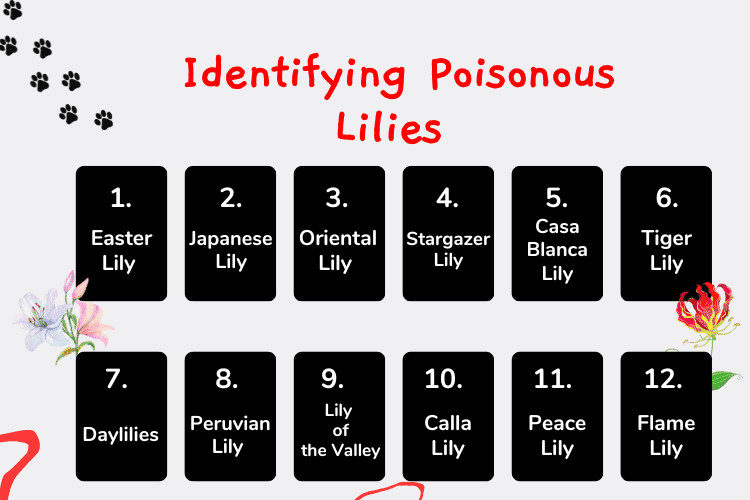
If you notice some unexpected coughs or gags, it could be that your cat has eaten something it shouldn’t, something toxic.
You see, cats are curious creatures. They might explore things they find around the house. But sometimes, what they explore can be dangerous.
Some human things, like medicines or certain foods, can harm them. And ingesting these objects can irritate their mouths and throats, making them gag.
But this isn’t the whole story. Gagging might lead to throwing up, trouble breathing, or more severe symptoms like seizures or kidney problems.
Cat Disorders that Cause Gagging
Unfortunately, gagging can also point to severe health issues for your furry friend. Here are some cat illnesses that may cause retching:
Heart Disease
Gagging in cats is sometimes related to heart issues. A heart condition called cardiomyopathy is common in feline animals, and retching is a primary indicator.
Feline heart disease doesn’t discriminate by age; even kittens can be affected due to congenital conditions.
Kidney Disease
Kidney issues, a familiar illness among cats, can result in a buildup of waste in the bloodstream. This accumulation can induce nausea in cats, triggering the cycle of gagging and vomiting.
Urinary tract infections can also become a contributing factor.
Lung Disease
Fluid from the cat’s lungs, such as in cases of pneumonia or pleural effusion, can move up to the throat during coughing, triggering a gag reflex. It’s common in conditions like bronchitis or respiratory disorders linked to heartworm disease.
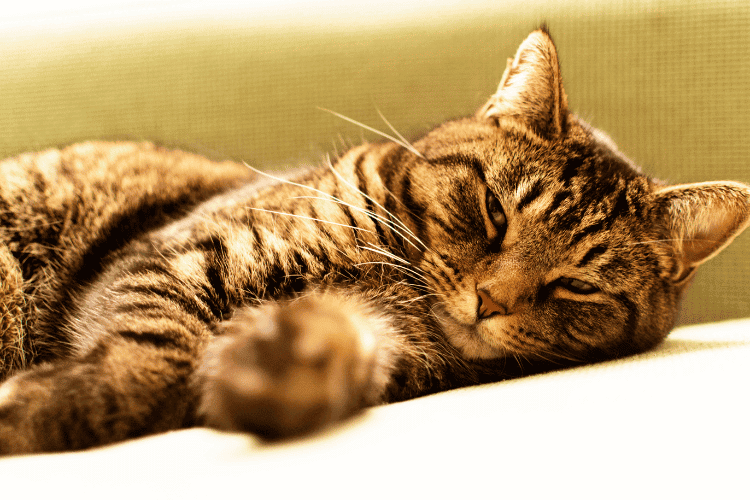
Abundant mucus in the throat could also cause your cat’s gagging.
What Should You Do When Your Cat Gags?
If your cat makes funny sounds while purring, it might worry you. Sometimes, it’s not a big problem, but other times, it might mean your cat needs medical attention.
If your cat eats too fast or has hairball issues, you can try home remedies to help. But if your cat exhibits other symptoms mentioned above, it’s best to see the vet as soon as possible.
Your cat’s health is important, so don’t hesitate to get help when you’re worried.
Also Check: Do Cats Get More Affectionate With Age?
Final Thoughts
Cats, our most enigmatic companions, have a knack for blending adorable quirks with mysterious antics. And they often leave us wondering about their actions.
Still, by understanding the potential reasons behind behaviors like gagging when purring, we can better care for and cherish our furry friends.
So the next time your cat emits a gentle purr followed by an unexpected gag, you’ll have a deeper insight into their world, ready to provide the love and attention they deserve.
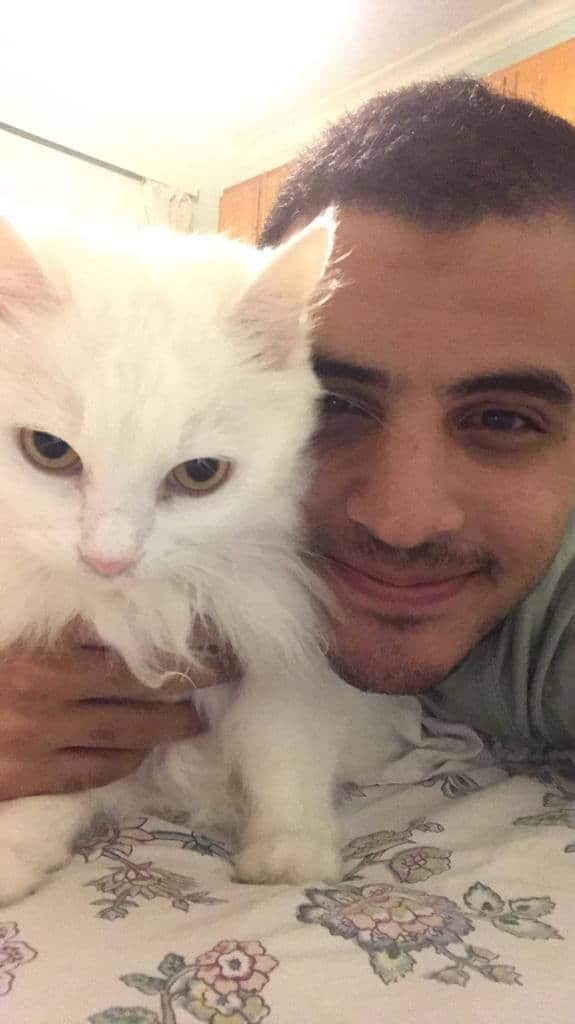
I’ve been living with cats since 2008 and I can confidently say I have more feline friends than humans lol. I currently live with 5 cats in different life stages; two of them are less than one year old, one is 2-ish years old and the oldest two are 9-ish years old. I’ve developed a strong bond with cats over the years and I’m eager to share my experience through this blog. You can learn more about my cats here.

